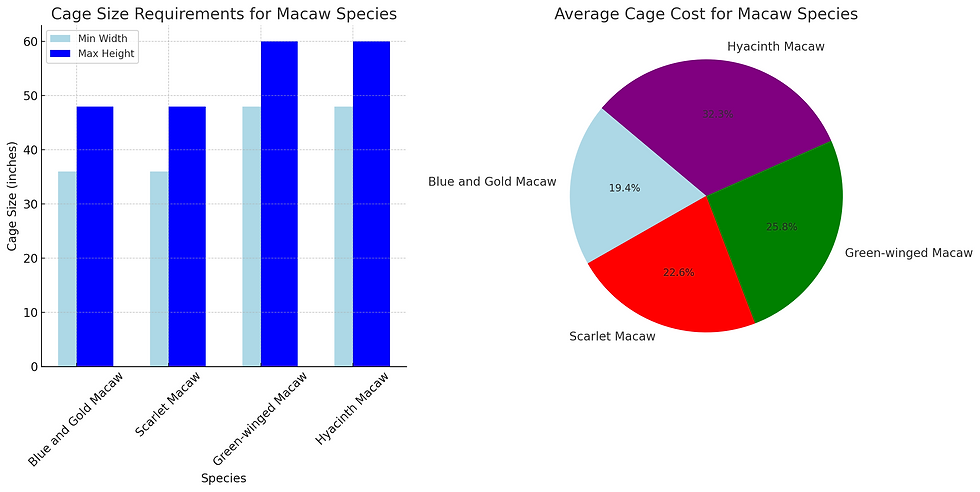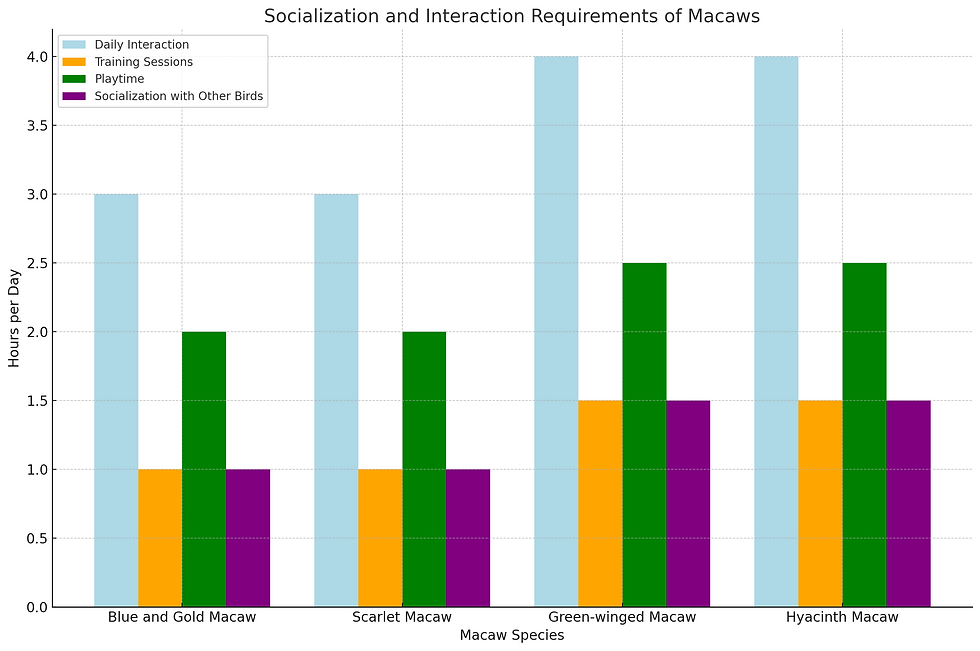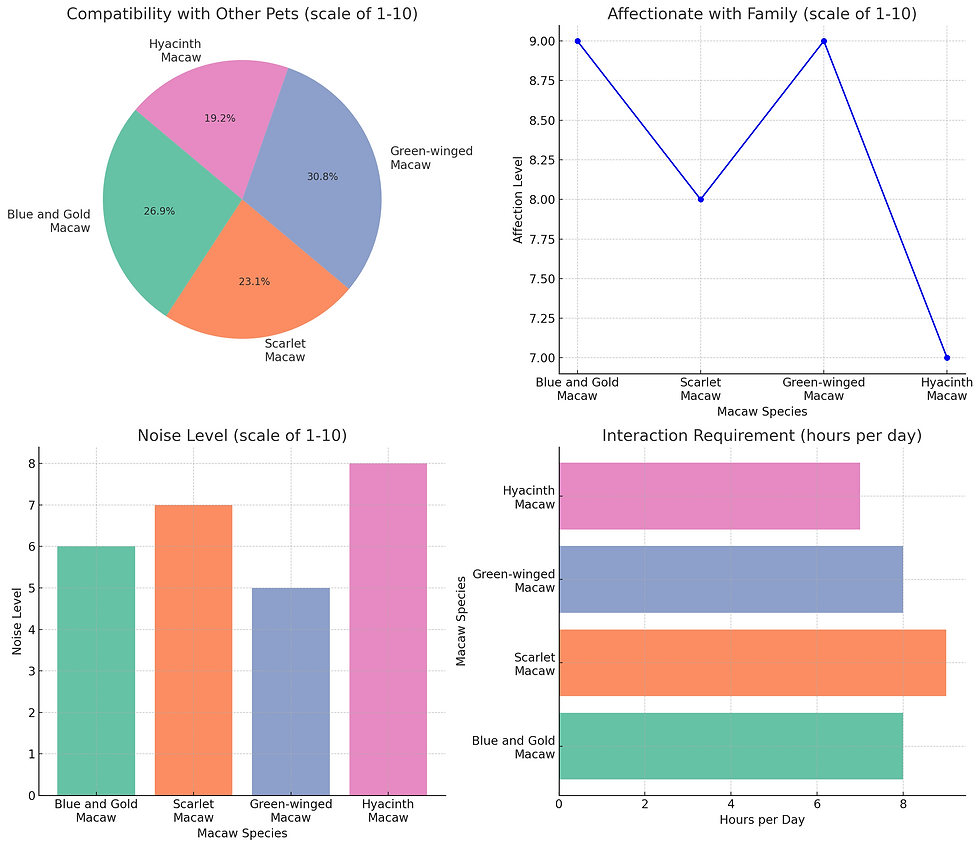Comprehensive Guide to Keeping Macaws as Pets
- Saifur Rahman
- Jul 27, 2024
- 16 min read

Key Takeaways
Key Points | Descriptions | Implications |
Species of Macaws | Understanding the different types of macaws and their unique characteristics. | Helps in choosing the right species based on size, temperament, and specific care needs. |
Housing and Enclosures | Providing the proper living environment for macaws, including cage size and setup. | Ensures the macaw has a safe, comfortable space that meets its physical and mental needs. |
Diet and Nutrition | Ensuring a balanced diet with the right mix of pellets, fruits, vegetables, and nuts. | Promotes overall health, prevents nutritional deficiencies, and supports a long lifespan. |
Socialization and Interaction | Importance of regular interaction, bonding activities, and social play. | Enhances mental well-being, reduces stress, and fosters a strong bond between the macaw and owner. |
Health and Veterinary Care | Regular veterinary check-ups, recognizing signs of illness, and preventative care. | Early detection and treatment of health issues, ensuring a healthy life for the macaw. |
Training and Behavior | Effective training methods, addressing behavioral issues, and understanding macaw behavior. | Ensures well-behaved macaws that are easier to handle and more enjoyable as pets. |
Breeding and Reproduction | Signs of breeding readiness, creating a suitable breeding environment, and caring for chicks. | Increases the chances of successful breeding and healthy chick development. |
Lifespan and Aging | Understanding the lifespan of macaws and providing appropriate care as they age. | Ensures that macaws receive the care they need throughout their lives, improving longevity and quality of life. |
Enrichment and Mental Stimulation | Providing toys, activities, and environmental changes to keep macaws mentally engaged. | Prevents boredom, reduces stress, and promotes mental health and happiness. |
Legal Considerations and Permits | Understanding legal requirements, permits, and regulations for owning and breeding macaws. | Ensures compliance with laws and ethical standards, avoiding legal issues and supporting conservation efforts. |
Cost and Financial Commitment | Initial and ongoing costs of owning a macaw, including food, veterinary care, and enrichment. | Helps in budgeting and financial planning to ensure that all the macaw's needs are met without financial strain. |
Compatibility and Family Dynamics | How macaws interact with other pets and family members, and ensuring a harmonious household. | Helps in creating a safe and loving environment where macaws can thrive alongside other pets and family members. |
Introduction
Did you know that macaws can live up to 50 years or more with proper care? These magnificent birds are not just pets; they are lifelong companions. Owning a macaw comes with great responsibility but also immense rewards. In this comprehensive guide, we will explore everything you need to know about keeping macaws as pets.
Macaws are known for their vibrant colors, intelligence, and playful nature. They are highly social birds that thrive on interaction and require a lot of attention and care. Whether you are considering getting a macaw or already have one, understanding their needs is crucial to ensure their health and happiness.
Our guide covers essential topics such as:
Species of Macaws: Learn about the different types of macaws and their unique characteristics.
Housing and Enclosures: Find out how to create the perfect living environment for your macaw.
Diet and Nutrition: Discover the best diet to keep your macaw healthy and active.
Socialization and Interaction: Understand the importance of social interaction and how to bond with your macaw.
Additionally, we will dive into Health and Veterinary Care, Training and Behavior, Breeding and Reproduction, Lifespan and Aging, and much more. Each section provides detailed information, tips, and strategies to help you become a better macaw owner.
Whether you are a new macaw owner or have years of experience, this guide is designed to offer valuable insights and practical advice. Let's embark on this journey to understand and care for these beautiful birds, ensuring they live a happy and fulfilling life.
Species of Macaws

What are the most common species of macaws kept as pets?
There are several species of macaws that are popular as pets. The Blue and Gold Macaw, Scarlet Macaw, Green-winged Macaw, and Hyacinth Macaw are among the most commonly kept.
The Scarlet Macaw is known for its vibrant red, yellow, and blue feathers.
The Hyacinth Macaw is the largest of the macaws, with stunning blue feathers.
How do different species of macaws vary in terms of size and appearance?
Macaws can vary greatly in size and appearance. The Blue and Gold Macaw is medium-sized with bright blue and yellow feathers, while the Hyacinth Macaw is much larger and all blue.
Species | Size | Appearance |
Blue and Gold Macaw | Medium | Blue and yellow feathers |
Hyacinth Macaw | Large | All blue feathers |
What are the specific care requirements for different species of macaws?
Each species of macaw has its own specific care requirements. For instance, the Green-winged Macaw requires a balanced diet that includes fruits, nuts, and vegetables.
For more detailed information on diet, you can refer to our guide on the importance of a balanced diet for birds.
Which species of macaws are known to be the most sociable and friendly?
The Blue and Gold Macaw and the Green-winged Macaw are known for their friendly and sociable nature. These species tend to bond well with their owners and enjoy interactive play.
For tips on how to bond with your macaw, check out our bonding techniques article.
Housing and Enclosures

What type of cage or enclosure is best suited for macaws?
Choosing the right cage or enclosure for your macaw is crucial for their health and happiness. Macaws need a spacious and sturdy cage to accommodate their size and activity level.
A cage with adequate size is essential for allowing your macaw to move around comfortably.
Ensure the cage is made of safe, durable materials that can withstand a macaw's strong beak.
The bar spacing should be appropriate to prevent your macaw from getting stuck or escaping.
How much space do macaws need in their enclosure?
Macaws are large birds that require plenty of space to stretch their wings and play. The cage should be at least 3 times the wingspan of the macaw in all directions.
Macaw Species | Minimum Cage Dimensions |
Blue and Gold Macaw | 36 x 48 x 60 inches |
Scarlet Macaw | 36 x 48 x 60 inches |
Hyacinth Macaw | 40 x 60 x 80 inches |
Additionally, macaws need space for toys and perches to keep them entertained and mentally stimulated.
What are the essential features to include in a macaw's cage?
A well-equipped macaw cage should have several essential features to ensure the bird's comfort and well-being:
Perches: Provide different types of perches, including wooden and rope perches, to keep your macaw's feet healthy.
Toys: Macaws are intelligent birds that need mental stimulation. Include a variety of toys, such as foraging toys and chew toys.
Feeding stations: Ensure there are dedicated spots for food and water that are easy to access and clean.
Nesting boxes: If you plan to breed your macaws, provide a nesting box to give them a safe place to lay eggs.
How can you ensure the safety and comfort of a macaw in its enclosure?
Maintaining the safety and comfort of your macaw in its enclosure involves several important steps:
Ensure proper temperature control to keep the environment comfortable for your macaw.
Good ventilation is crucial to prevent respiratory problems. Make sure the cage is well-ventilated but not drafty.
Regularly clean the cage to maintain hygiene and prevent infections.
Remove any potential hazards, such as sharp edges or toxic materials, from the cage to prevent injuries.
For more tips on keeping your macaw's environment safe and comfortable, check out our detailed guide on daily care routines.
Diet and Nutrition

What is the ideal diet for a pet macaw?
Ensuring a balanced diet is crucial for the health and well-being of your macaw. A proper diet includes a variety of foods that provide the necessary nutrients.
Pellets: These should make up the majority of your macaw's diet as they are formulated to provide balanced nutrition. Learn more about the benefits of pellet diets.
Fruits and vegetables: Fresh fruits and vegetables are essential for vitamins and minerals. Include a variety of colorful produce.
Nuts and seeds: These can be given as treats, but should not be the main part of the diet due to high fat content.
Supplements: Occasionally, supplements may be needed to ensure all nutritional needs are met. Consult your veterinarian for advice.
How often should you feed a macaw?
Feeding your macaw the right amount at the right times is important for maintaining their health. Here's a simple schedule to follow:
Daily meals: Provide fresh food twice a day - in the morning and evening.
Portion sizes: Adjust the portions based on your macaw's size and activity level.
Treat frequency: Offer healthy treats like nuts and seeds sparingly, about 2-3 times a week.
Hydration: Ensure fresh water is available at all times.
For a more detailed feeding schedule, check out our guide on daily care routines.
What are the common nutritional deficiencies in macaws and how to prevent them?
Macaws can suffer from nutritional deficiencies if their diet is not properly balanced. Common deficiencies include:
Nutrient | Deficiency Symptoms | Prevention |
Vitamin A | Poor feather quality, respiratory issues | Include more dark leafy greens and orange vegetables |
Calcium | Weak bones, poor eggshell quality | Provide cuttlebone or calcium supplements |
Vitamin D | Soft bones, beak abnormalities | Ensure access to natural sunlight or use full-spectrum lighting |
For more on how to ensure your macaw's diet is balanced, visit our article on the importance of a balanced diet for birds.
What treats are safe and healthy for macaws?
Treats can be a fun and nutritious part of your macaw's diet if given in moderation. Safe and healthy treats include:
Safe fruits: Apples, bananas, berries, and melons.
Safe vegetables: Carrots, peas, sweet potatoes, and leafy greens.
Nuts: Almonds, walnuts, and pecans, but only in small quantities.
Commercial treats: Look for treats specifically formulated for parrots that do not contain added sugars or artificial ingredients.
For more ideas on safe treats, read our article on fresh foods for birds.
Socialization and Interaction

How much social interaction do macaws need on a daily basis?
Macaws are highly social birds that thrive on interaction. They require regular engagement to stay happy and healthy.
Interaction time: Macaws need at least 2-3 hours of social interaction daily.
Social activities: Include activities like talking, playing, and training sessions.
Signs of loneliness: Watch for signs such as feather plucking or excessive vocalization which indicate your macaw needs more attention.
Playtime requirements: Provide toys and opportunities for your macaw to play outside the cage.
Learn more about daily care routines in our detailed guide.
What are the best ways to bond with your macaw?
Building a strong bond with your macaw involves patience and consistency. Here are some effective methods:
Training sessions: Use positive reinforcement techniques to train your macaw. Check out our guide on basic commands for birds.
Shared activities: Spend time doing activities your macaw enjoys, like playing with toys or exploring new environments.
Positive reinforcement: Reward good behavior with treats and praise.
Trust-building exercises: Gradually increase physical contact and ensure your macaw feels safe and comfortable with you.
How can you tell if your macaw is getting enough social interaction?
Monitoring your macaw's behavior can help you determine if they are receiving sufficient social interaction:
Behavioral signs: A well-socialized macaw will exhibit playful and friendly behavior.
Vocalizations: Regular, varied vocalizations indicate a happy and engaged macaw.
Physical health: Good feather condition and active behavior are signs of a well-socialized bird.
Social behaviors: Interacting well with other pets and family members is a positive sign.
For more information on common behaviors, visit our article on bird behaviors.
What are the signs of a well-socialized macaw?
A well-socialized macaw will show several positive behaviors:
Friendly behavior: Approaches people confidently and without fear.
Playfulness: Engages with toys and enjoys interactive play.
Reduced aggression: Less likely to bite or show aggressive behavior.
Comfort with handling: Allows handling and enjoys being petted or held.
For bonding techniques, read our article on bonding with your bird.
Health and Veterinary Care

What are the common health issues in macaws?
Macaws are generally healthy birds, but they can encounter certain health problems. Knowing these issues can help you catch them early and get the right treatment.
Respiratory issues: Symptoms include wheezing, coughing, and nasal discharge. For more details, check out our article on common bird diseases.
Digestive problems: Look for signs such as diarrhea, vomiting, or lack of appetite.
Feather plucking: Often caused by stress, boredom, or medical conditions.
Beak disorders: Watch for overgrowth, deformities, or discoloration.
How often should macaws visit the veterinarian?
Regular veterinary visits are crucial to keep your macaw healthy. Here’s a basic schedule:
Regular check-ups: Schedule an annual check-up to monitor overall health.
Emergency visits: Seek immediate care if you notice sudden changes in behavior or health.
Vaccination schedules: Follow your vet’s advice on necessary vaccinations.
Preventative care: Regular screenings and tests can help catch issues early.
What vaccinations and preventative care do macaws require?
Preventative care, including vaccinations, is vital to protect your macaw from diseases:
Common vaccinations: Consult your vet about essential vaccines for your region.
Parasite control: Regular treatments to prevent mites, lice, and worms.
Preventative treatments: Scheduled medications to prevent common illnesses.
Health screenings: Routine blood tests and physical exams to monitor health.
For tips on maintaining your macaw’s health, check out our guide on the importance of a balanced diet for birds.
How can you recognize early signs of illness in macaws?
Identifying early signs of illness can help you get prompt veterinary care:
Changes in behavior: Watch for lethargy, aggression, or unusual activity levels.
Physical symptoms: Notice any changes in feathers, beak, eyes, or droppings.
Eating and drinking habits: Monitor for decreased appetite or changes in drinking patterns.
Vocalization changes: Sudden changes in the frequency or type of vocalizations.
For more detailed advice on recognizing illness, visit our article on common bird diseases.
Training and Behavior

What are the best training methods for macaws?
Training your macaw helps in building a strong bond and ensuring good behavior. Here are some effective training methods:
Positive reinforcement: Rewarding your macaw with treats and praise when they perform a desired behavior.
Clicker training: Using a clicker to mark the exact moment your macaw does something right, followed by a reward.
Target training: Teaching your macaw to touch a target with its beak, which can help with more complex tricks.
Social learning: Allowing your macaw to observe and mimic other trained birds or people.
For more detailed tips, check out our guide on basic commands for birds.
How can you address and correct behavioral issues in macaws?
Addressing behavioral issues in macaws requires understanding the root cause and consistent training:
Identifying causes: Determine if the behavior is due to boredom, lack of socialization, or environmental stress.
Behavioral modification: Use positive reinforcement to encourage good behavior and discourage bad behavior.
Consistency: Be consistent with your training methods and responses to ensure your macaw understands what is expected.
Professional help: If issues persist, consider consulting an avian behaviorist for specialized advice.
For more information on managing aggression, visit our article on aggression in birds.
What are the common behavioral traits of macaws?
Understanding the common behavioral traits of macaws can help you provide better care:
Behavioral Trait | Description |
Playfulness | Macaws are very playful and enjoy interacting with toys and their owners. |
Curiosity | They are naturally curious and love to explore their environment. |
Territoriality | Macaws can be territorial, especially during breeding season. |
Social behaviors | They are social birds that thrive on interaction with their flock or human family. |
For more on macaw behavior, read our article on common bird behaviors.
How can you train a macaw to perform tricks or tasks?
Training your macaw to perform tricks or tasks can be a fun and rewarding experience for both you and your bird:
Step-by-step training: Break down the trick into small, manageable steps and teach each step individually.
Motivation: Use your macaw’s favorite treats or toys as motivation.
Consistent practice: Regular, short training sessions are more effective than long, infrequent ones.
Reward systems: Always reward your macaw immediately after they perform the desired action.
For detailed training techniques, check out our guide on basic commands for birds.
Breeding and Reproduction

What are the signs that a macaw is ready to breed?
Understanding when your macaw is ready to breed is crucial for successful reproduction:
Mating behaviors: Macaws will display behaviors such as mutual preening and feeding each other.
Physical readiness: Look for signs like increased vocalization and more active courtship displays.
Nesting preparation: Macaws might start preparing their nesting area by arranging nesting materials.
Hormonal changes: There might be visible changes in behavior due to hormonal shifts, such as increased aggression or affection.
For more detailed information, visit our article on breeding basics.
How can you create a suitable breeding environment for macaws?
Creating the right environment is essential for encouraging macaws to breed:
Nest boxes: Provide a suitable nest box that is large enough for the macaw to feel secure.
Privacy: Ensure the breeding area is quiet and private to reduce stress.
Temperature control: Maintain a stable temperature to create a comfortable environment for breeding.
Diet adjustments: Provide a nutrient-rich diet to support the health of breeding macaws.
For more tips on setting up a breeding environment, check out our guide on breeding pairs.
What are the common challenges in breeding macaws?
Breeding macaws can come with several challenges that need to be addressed:
Infertility: Some macaws may have difficulty conceiving, which can be due to health issues or incompatible pairs.
Aggression: Breeding pairs might show increased aggression towards each other or their owners.
Egg binding: Female macaws can sometimes have trouble laying eggs, which requires immediate veterinary attention.
Chick survival: Ensuring the chicks survive and thrive requires careful monitoring and appropriate care.
To learn more about overcoming these challenges, read our article on breeding basics.
How do you care for macaw chicks?
Caring for macaw chicks involves providing the right environment and nutrition to ensure their growth and development:
Care Aspect | Details |
Feeding | Provide a diet rich in nutrients, including hand-feeding formula if necessary. |
Temperature regulation | Keep the nesting area warm and draft-free to support the chicks' health. |
Health monitoring | Regularly check the chicks for signs of illness and ensure they are growing properly. |
Socialization | Start gentle socialization early to ensure they become well-adjusted adults. |
For more on caring for macaw chicks, visit our guide on breeding pairs.
Lifespan and Aging

What is the average lifespan of a pet macaw?
Macaws are known for their long lifespans, which can be a significant commitment for any pet owner:
Lifespan ranges: Macaws can live between 30 to 50 years, and some even longer with proper care.
Factors affecting lifespan: Diet, environment, and veterinary care all play crucial roles.
Life stages: Understanding the different stages of a macaw's life can help in providing appropriate care at each stage.
Comparison with other birds: Macaws generally live longer than many other pet bird species.
For more details on macaw care, check out our daily care routine guide.
How do macaws' needs change as they age?
As macaws age, their needs change, requiring different care to keep them healthy:
Dietary adjustments: Older macaws may require specialized diets to ensure they receive adequate nutrition.
Activity levels: They might be less active and require less intensive physical exercise.
Health concerns: Regular veterinary check-ups become even more critical to catch age-related issues early.
Environmental modifications: Ensuring their environment is safe and accessible, like adding softer perches for arthritic feet.
What special care do elderly macaws require?
Providing the right care for elderly macaws can greatly enhance their quality of life:
Care Aspect | Details |
Mobility aids | Provide easier-to-climb perches and ramps to help them move around comfortably. |
Dietary supplements | Consider supplements to support joint health and overall well-being. |
Regular health check-ups | Increased frequency of veterinary visits to monitor and manage age-related health issues. |
Comfort measures | Ensure their living space is warm and free from drafts to keep them comfortable. |
For tips on creating a comfortable environment, see our guide on cage size guidelines.
How can you improve the longevity and quality of life for your macaw?
Improving the longevity and quality of life for your macaw involves a combination of proper care and attention:
Balanced diet: Ensure your macaw receives a varied and balanced diet rich in essential nutrients.
Regular exercise: Encourage daily physical activity to keep them fit and healthy.
Mental stimulation: Provide toys and activities that challenge their minds and prevent boredom.
Preventative care: Regular check-ups and prompt treatment of any health issues are crucial.
For more on maintaining a balanced diet, read our article on the importance of a balanced diet for birds.
Enrichment and Mental Stimulation

What types of toys are best for macaws?
Providing the right toys is essential for keeping your macaw entertained and mentally stimulated:
Foraging toys: These toys encourage your macaw to search for food, mimicking their natural behavior.
Puzzle toys: Engaging your macaw’s problem-solving skills helps keep their mind active.
Chew toys: Macaws love to chew, so provide toys made of safe, durable materials.
Climbing toys: Ladders and ropes offer physical activity and fun.
For more information, check out our article on the best bird toys.
How can you create a stimulating environment for your macaw?
Creating a stimulating environment involves more than just toys. Here are some tips:
Varied toys: Regularly rotate the toys to keep your macaw interested and engaged.
Interactive activities: Spend time interacting with your macaw through training and play.
Environmental changes: Occasionally rearrange the cage setup to create a new and interesting environment.
Social interaction: Ensure your macaw gets plenty of attention and interaction with you and other birds if possible.
What activities help keep macaws mentally engaged?
Engaging activities are crucial for your macaw’s mental well-being:
Activity | Description |
Training sessions | Teach your macaw new tricks and commands using positive reinforcement techniques. |
Foraging | Hide food around the cage to encourage natural foraging behavior. |
Playtime | Engage your macaw with interactive play using various toys. |
Socialization | Allow your macaw to interact with other birds or family members. |
For more ideas on enrichment, visit our guide on bird toys.
How often should you rotate toys and enrichment activities for macaws?
Rotating toys and enrichment activities keeps your macaw from becoming bored:
Rotation schedule: Change the toys at least once a week to keep things fresh.
New toy introduction: Gradually introduce new toys to gauge your macaw’s interest and ensure safety.
Seasonal changes: Adjust toys and activities based on seasons and holidays for added variety.
Monitoring interest: Pay attention to which toys your macaw prefers and rotate those more frequently.
For more tips on daily care, check out our article on daily care routines.
Legal Considerations and Permits
What legal requirements must be met to own a macaw?
Owning a macaw comes with specific legal requirements to ensure the bird's well-being and compliance with local laws:
Ownership laws: Check your local and national regulations regarding the legal ownership of macaws.
Permit requirements: Some areas require permits to keep exotic birds like macaws. Ensure you have the necessary paperwork.
Endangered species regulations: Macaws are protected under various wildlife conservation laws, including CITES (Convention on International Trade in Endangered Species).
Local ordinances: Be aware of any local restrictions on keeping large parrots, including noise and housing regulations.
For more on this topic, you can read about legal considerations for bird ownership.
Are there any permits or licenses required to keep a macaw?
Permits and licenses might be necessary depending on where you live. Here are some common requirements:
Import permits: If you are importing a macaw, you will need an import permit to comply with international regulations.
Breeding licenses: If you plan to breed macaws, a breeding license may be required to ensure ethical practices.
Wildlife permits: Specific permits are needed to keep wildlife, which includes certain species of macaws.
Registration requirements: Some regions require you to register your macaw with local authorities.
What are the regulations for breeding and selling macaws?
Breeding and selling macaws are regulated to prevent illegal trade and ensure ethical practices:
Regulation | Description |
Breeding permits | Required to ensure breeders follow ethical guidelines and provide proper care for the birds. |
Sales regulations | Laws that regulate how macaws can be sold, including age and health requirements. |
Export laws | Regulations governing the export of macaws to ensure compliance with international wildlife protection laws. |
Record-keeping requirements | Breeders must keep detailed records of their macaws to track their health and lineage. |
For more details on ethical breeding practices, visit our guide on breeding basics.
How do international laws affect the ownership of macaws?
International laws play a significant role in the ownership and trade of macaws:
CITES regulations: The Convention on International Trade in Endangered Species protects macaws from illegal trade. Ensure your macaw is sourced legally.
Import/export restrictions: Various countries have specific rules for importing and exporting macaws to prevent illegal trafficking.
Conservation laws: These laws aim to protect endangered species and their habitats.
Legal ownership: Ensure you comply with international laws regarding the legal ownership of exotic birds.
For more on international laws and how they impact bird ownership, visit our legal considerations section.
Cost and Financial Commitment

What is the initial cost of purchasing a macaw?
Purchasing a macaw involves significant initial costs, which include:
Purchase price: The cost of a macaw can range from $1,000 to $5,000 or more, depending on the species.
Cage and accessories: A spacious cage and essential accessories can cost between $500 and $1,000. Learn more about choosing the right cage in our cage selection guide.
Initial veterinary care: Expect to spend around $200 to $500 for initial health check-ups and vaccinations.
Initial supplies: Toys, perches, and food for the first few months can add another $100 to $200.
What are the ongoing costs associated with keeping a macaw?
Keeping a macaw involves various ongoing expenses to ensure their well-being:
Food: High-quality pellets, fresh fruits, and vegetables can cost around $50 to $100 per month. Read more about proper nutrition in our guide on the importance of a balanced diet for birds.
Veterinary care: Regular check-ups and potential treatments can amount to $200 to $500 annually.
Toys and enrichment: To keep your macaw entertained and mentally stimulated, budget for new toys regularly, costing about $20 to $50 per month. Check our guide on the best bird toys.
Housing maintenance: Cleaning supplies and replacement perches or accessories may cost around $100 per year.
How can you budget for unexpected veterinary expenses for a macaw?
Planning for unexpected veterinary expenses is crucial for responsible macaw ownership:
Emergency funds: Set aside an emergency fund of at least $500 to $1,000 to cover unexpected medical costs.
Pet insurance: Consider purchasing pet insurance to help manage potential high-cost treatments.
Regular savings: Save a small amount each month to gradually build a fund for any future health issues.
Cost management strategies: Maintain regular veterinary check-ups to catch health issues early and avoid costly treatments.
What are the costs of breeding macaws?
Breeding macaws involves specific costs that potential breeders should consider:
Expense | Description |
Breeding setup | Includes nesting boxes, additional cages, and necessary equipment, costing around $500 to $1,000. |
Chick care | Feeding and caring for chicks can cost $100 to $200 per chick until they are weaned. |
Health care | Veterinary care for breeding pairs and chicks can add up, with costs varying based on health needs. |
Marketing and sales | Advertising and finding homes for the chicks can incur additional expenses. |
For more information on breeding practices, read our article on breeding basics.
Compatibility and Family Dynamics

How well do macaws get along with other pets?
Introducing a macaw to a household with other pets requires careful consideration and supervision:
Interaction with dogs: Macaws can coexist with dogs, but introductions should be supervised to ensure safety.
Interaction with cats: Cats can pose a risk to macaws due to their predatory nature. Always supervise interactions.
Interaction with other birds: Macaws can get along with other birds, but it's essential to monitor their behavior and ensure they have enough space.
Supervision requirements: Always supervise interactions between macaws and other pets to prevent accidents and ensure harmonious relationships.
For more details on bird behaviors, visit our article on common bird behaviors.
Are macaws suitable for families with young children?
Macaws can be wonderful pets for families, but there are important considerations when young children are involved:
Safety considerations: Macaws have strong beaks and can deliver powerful bites. Teach children to interact gently and respectfully.
Child-macaw interactions: Supervise all interactions between children and macaws to ensure safe and positive experiences.
Supervision: Never leave young children alone with a macaw to prevent accidental injuries.
Education: Educate children on how to properly handle and care for a macaw, fostering a respectful and caring relationship.
For more information on daily care routines, check out our guide on daily care routines.
How can you introduce a macaw to a new household?
Introducing a macaw to a new home requires patience and careful planning:
Step | Description |
Introduction process | Gradually introduce the macaw to its new environment, allowing it to explore and get comfortable at its own pace. |
Adjustment period | Give the macaw time to adjust to new sights, sounds, and smells. Be patient and avoid overwhelming it. |
Family involvement | Involve all family members in the introduction process to help the macaw get used to everyone. |
Monitoring | Monitor the macaw’s behavior for signs of stress or discomfort, and provide reassurance and comfort as needed. |
What are the signs that a macaw is comfortable and happy in its home?
Recognizing the signs of a happy macaw can help ensure you’re meeting its needs:
Relaxed behavior: A comfortable macaw will display relaxed body language, such as preening and perching calmly.
Playfulness: Engaging with toys and interacting with family members are signs of a happy macaw.
Healthy appetite: Eating well and showing interest in a variety of foods indicate good health and well-being.
Positive social interactions: A content macaw will seek out and enjoy social interactions with its human family.
For bonding techniques, read our article on bonding with your bird.
Conclusion
In conclusion, keeping a macaw as a pet is a rewarding but demanding commitment. These vibrant and intelligent birds require a great deal of attention, care, and understanding to thrive. By ensuring proper housing and enclosures, providing a balanced diet and nutrition, and maintaining regular health and veterinary care, you can help your macaw live a long, healthy, and happy life.
We have explored the different species of macaws and their unique needs, the importance of socialization and interaction, and effective training and behavior techniques. Additionally, we discussed breeding and reproduction practices, the specific care required for macaws as they age, and ways to provide enrichment and mental stimulation to keep them engaged.
Compatibility and family dynamics: Understanding how macaws interact with other pets and family members is crucial for a harmonious household.
Legal considerations and permits: Ensuring you meet all legal requirements is essential for responsible macaw ownership.
Cost and financial commitment: Being aware of the financial aspects helps in planning and managing the expenses of keeping a macaw.
By following the advice and tips provided in this guide, you can ensure that your macaw receives the best possible care, creating a strong bond and a fulfilling life for both you and your feathered friend.
Remember, the journey with your macaw is a lifelong adventure filled with joy and companionship. With dedication and love, you can make this experience truly remarkable.



Comments